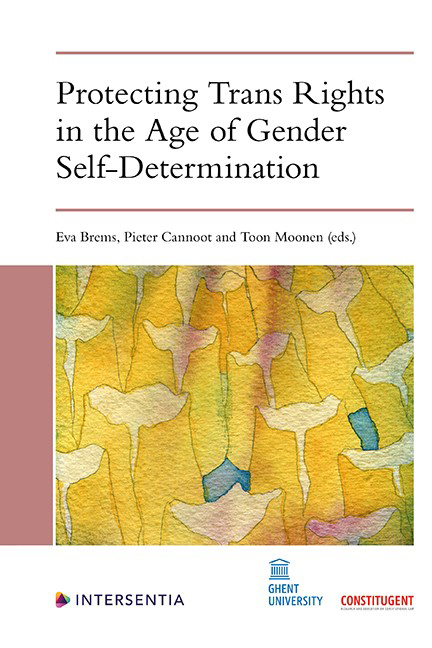Book contents
- Frontmatter
- Contents
- List of Cases
- List of Authors
- Introduction
- The Limits to Gender Self-Determination in a Stereotyped Legal System: Lessons from the Belgian Gender Recognition Act
- From Assigning Sex to Affirming Gender: Remarks on an Ongoing Evolution Affecting Gender Identification
- The Insufficiency of Gender Recognition Acts: The Example of Schooldays in Norway
- Developments in German Civil Status Law on the Recognition of Intersex and Non-Binary Persons: Subversion Subverted
- Framing Equality: Debating Protected Grounds in the Field of Trans and Non-Binary Rights
- ‘True Sex’: The Law and Confirmation of One’s Sex
- Index
- About the Editors
‘True Sex’: The Law and Confirmation of One’s Sex
Published online by Cambridge University Press: 11 February 2021
- Frontmatter
- Contents
- List of Cases
- List of Authors
- Introduction
- The Limits to Gender Self-Determination in a Stereotyped Legal System: Lessons from the Belgian Gender Recognition Act
- From Assigning Sex to Affirming Gender: Remarks on an Ongoing Evolution Affecting Gender Identification
- The Insufficiency of Gender Recognition Acts: The Example of Schooldays in Norway
- Developments in German Civil Status Law on the Recognition of Intersex and Non-Binary Persons: Subversion Subverted
- Framing Equality: Debating Protected Grounds in the Field of Trans and Non-Binary Rights
- ‘True Sex’: The Law and Confirmation of One’s Sex
- Index
- About the Editors
Summary
INTRODUCTION
This chapter starts from the suggestion that, far from serving as a passive surface upon which sexual scripts are inscribed, the body is itself a dynamic force in generating (sexual) subjectivities and legal identities and that the specific configuration of sexual practices is central to the making of (gender) identities. The prevalent Czech trans discourse is dominated by a medical definition of trans people as distinct from certain norms and, as such, gender non-conformity is defined as a disorder that needs to be rectified, according to a standard that is found in normative medical and expert texts. The legal framework reflects medical normativity; the concept of gender identity is unknown, and it explicitly uses the term ‘sex identity/sex change’. The change of biological sex, as understood by the Czech laws, is de facto a process of reconciliation between the internal identity and its bodily representation. Hand in hand with the medical discourse, legal discourse co-creates the world in which trans people live. Czech law does not draw information on the lives of trans people from consistent engagement with the trans community, but rather relies completely on the deep-seated convictions of medical professionals and established experts who perpetuate the transsexual label. As a result of this, the Czech law lays down several institutions and procedures that trans people wishing to transition cannot escape – perhaps most tellingly demonstrated by the requirements of sterilisation and divorce for legal gender recognition. Both the medical and the legal discourse present their understanding of trans people as based on self-evident facts – referring, of course, to the binary understating of human existence – and not on communication with the trans community wishing to transition. The procedure is almost fully covered by public health insurance and, without the consent of the State bodies, there can be no transition; hence those trans people who start the procedure and wish to complete it must always conform to the pre-existing categories and understanding.
It is a notorious fact, which does not apply to the Czech context specifically, that trans people cannot be readily categorised and easily placed within the existing binary (male/female) systems. Therefore, it is very difficult for not only the trans people themselves, but also for the legal and cultural system which we all inhabit and fill with meanings and value systems, to find ways to somehow co-exist.
- Type
- Chapter
- Information
- Protecting Trans Rights in the Age of Gender Self-Determination , pp. 145 - 170Publisher: IntersentiaPrint publication year: 2020



